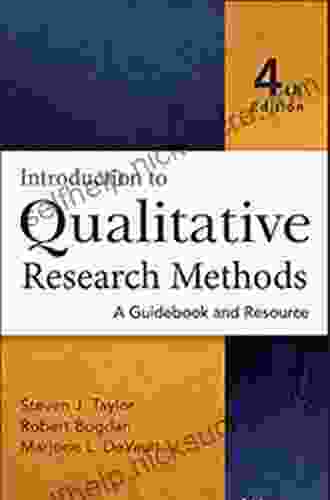Introduction to Qualitative Research Methods: Uncovering Insights from Non-Numerical Data

4.6 out of 5
| Language | : | English |
| File size | : | 8799 KB |
| Text-to-Speech | : | Enabled |
| Enhanced typesetting | : | Enabled |
| Word Wise | : | Enabled |
| Print length | : | 379 pages |
| Screen Reader | : | Supported |
What is Qualitative Research?
Qualitative research is a research methodology that seeks to understand and interpret non-numerical data to explore social phenomena and human experiences. It aims to gain insights into complex issues and uncover in-depth knowledge that cannot be captured through quantitative methods alone.
Qualitative researchers use a range of techniques to collect data, including interviews, focus groups, participant observation, and document analysis. These methods allow researchers to gather rich and detailed information about individuals' thoughts, feelings, and experiences.
Advantages of Qualitative Research
- In-depth understanding: Qualitative research provides a comprehensive understanding of complex social phenomena by exploring the nuances and subtleties of human behavior.
- Contextualized data: It captures the context and meaning of individuals' experiences, taking into account the social, cultural, and environmental factors that shape their thoughts and actions.
- Exploration of hidden perspectives: Qualitative methods allow researchers to uncover hidden perspectives and experiences that may not be accessible through quantitative surveys or experiments.
- Flexibility and adaptability: The research design can be adapted to emerging themes and insights as the data collection progresses, allowing for a more iterative and flexible approach.
Limitations of Qualitative Research
- Generalizability: Findings from qualitative research may not be easily generalizable to a larger population due to the use of small sample sizes and subjective data.
- Researcher bias: Researchers' interpretations and preconceptions may influence the analysis and interpretation of the data.
- Time-consuming and resource-intensive: Qualitative research can be time-consuming and requires significant resources in terms of data collection, analysis, and interpretation.
Step-by-Step Approach to Qualitative Research
- Define research question: Formulate clear research questions that guide the data collection and analysis.
- Select research method: Choose appropriate qualitative methods based on the research question, such as interviews, focus groups, or participant observation.
- Design research instrument: Develop interview guides, focus group protocols, or observation schedules to ensure consistent data collection.
- Collect data: Conduct interviews, focus groups, or observations to gather rich and detailed qualitative data.
- Transcribe and code data: Transcribe interviews or observations verbatim and code the data into themes and categories for analysis.
- Analyze data: Interpret the coded data to identify patterns, develop themes, and draw s.
- Report findings: Present the research findings in a clear and concise manner, ensuring transparency and rigor.
Types of Qualitative Research Methods
Interview:
- Structured interviews: Fixed set of questions with predetermined response options.
- Semi-structured interviews: Some flexibility in questioning, allowing for follow-up probes.
- Unstructured interviews: Free-flowing conversations with minimal structure.
Focus Group:
- Group discussions with 6-12 participants, moderated by a researcher.
- Explore shared experiences, opinions, and attitudes.
- Generate new insights and identify emerging themes.
Participant Observation:
- Researcher directly observes and participates in the daily activities of participants.
- Gain insights into natural settings and social interactions.
- Understand cultural norms, practices, and behaviors.
Grounded Theory:
- Iterative process of data collection, coding, and theory building.
- Develops theories from the ground up, based on empirical data.
- Explores social processes and interactions in depth.
Phenomenology:
- Explores subjective experiences and perceptions of individuals.
- Focuses on understanding the lived experiences of participants.
- Uses interviews and other methods to capture rich descriptions of individuals' experiences.
Ethnography:
- Long-term, in-depth study of a particular culture or community.
- Combines participant observation, interviews, and other methods to provide a comprehensive understanding.
- Explores social norms, beliefs, and values.
Qualitative research methods provide valuable tools for researchers seeking to explore complex social phenomena and understand human experiences. By collecting and analyzing non-numerical data, researchers can gain in-depth insights into the thoughts, feelings, and behaviors of individuals. While qualitative research has its limitations, it complements quantitative methods and contributes to a comprehensive understanding of the human experience. By embracing the principles and approaches outlined in this guide, researchers can effectively conduct qualitative studies and uncover rich and meaningful insights.
4.6 out of 5
| Language | : | English |
| File size | : | 8799 KB |
| Text-to-Speech | : | Enabled |
| Enhanced typesetting | : | Enabled |
| Word Wise | : | Enabled |
| Print length | : | 379 pages |
| Screen Reader | : | Supported |
Do you want to contribute by writing guest posts on this blog?
Please contact us and send us a resume of previous articles that you have written.
 Fiction
Fiction Non Fiction
Non Fiction Romance
Romance Mystery
Mystery Thriller
Thriller SciFi
SciFi Fantasy
Fantasy Horror
Horror Biography
Biography Selfhelp
Selfhelp Business
Business History
History Classics
Classics Poetry
Poetry Childrens
Childrens Young Adult
Young Adult Educational
Educational Cooking
Cooking Travel
Travel Lifestyle
Lifestyle Spirituality
Spirituality Health
Health Fitness
Fitness Technology
Technology Science
Science Arts
Arts Crafts
Crafts DIY
DIY Gardening
Gardening Petcare
Petcare Eric S Raymond
Eric S Raymond Harry Bauld
Harry Bauld Heather Heying
Heather Heying Kira Breed Wrisley
Kira Breed Wrisley Samantha Bongeka Nqoko
Samantha Bongeka Nqoko Ernestine Gilbreth Carey
Ernestine Gilbreth Carey Ethan Gallogly
Ethan Gallogly Hilary Scarlett
Hilary Scarlett Paul Bodine
Paul Bodine Carolyn Wyman
Carolyn Wyman Dan Blanchard
Dan Blanchard Tony Clunn
Tony Clunn Sarah B Bush
Sarah B Bush Stephanie Donaldson Pressman
Stephanie Donaldson Pressman Gary Webster
Gary Webster Lisa Gache
Lisa Gache Fennel Hudson
Fennel Hudson Suzanne Jurmain
Suzanne Jurmain Susan M Sheridan
Susan M Sheridan Mark Baker
Mark Baker Athena P Kourtis
Athena P Kourtis Gail M Nelson
Gail M Nelson Lori Foster
Lori Foster Brent Dykes
Brent Dykes Dima Zales
Dima Zales Claire Nance
Claire Nance Joanne Simon Walters
Joanne Simon Walters Brett Ortler
Brett Ortler Siddhartha Mukherjee
Siddhartha Mukherjee Foster Provost
Foster Provost Bob Smale
Bob Smale Johny Pitts
Johny Pitts Izabelle Winter
Izabelle Winter Steven Rinella
Steven Rinella Steven Brill
Steven Brill Augustus M Walton
Augustus M Walton Duncan J Watts
Duncan J Watts Alan Vermilye
Alan Vermilye Picabo Street
Picabo Street Lizzie Lane
Lizzie Lane Vicki Hoefle
Vicki Hoefle Susan F Paterno
Susan F Paterno Steve Oakes
Steve Oakes Mandy Khoshnevisan
Mandy Khoshnevisan Jeffrey Freed
Jeffrey Freed Martin Rees
Martin Rees B F Skinner
B F Skinner Nic Stone
Nic Stone Jim Holt
Jim Holt Patrisia Gonzales
Patrisia Gonzales Proprietary Edition Kindle Edition
Proprietary Edition Kindle Edition Gareth Loy
Gareth Loy T Berry Brazelton
T Berry Brazelton Dave Ramsey
Dave Ramsey Matt Forbeck
Matt Forbeck Nsca National Strength Conditioning Association
Nsca National Strength Conditioning Association Gaby Melian
Gaby Melian John Skinner
John Skinner Jesus Salcedo
Jesus Salcedo Jayme Adelson Goldstein
Jayme Adelson Goldstein Geoffrey Budworth
Geoffrey Budworth Tori Bortman
Tori Bortman Casey Schreiner
Casey Schreiner Manly P Hall
Manly P Hall John Austin
John Austin Janis B Meredith
Janis B Meredith Thane K Pratt
Thane K Pratt Gabriela Rosa
Gabriela Rosa Sarah Boslaugh
Sarah Boslaugh Ayesha Ratnayake
Ayesha Ratnayake Lisa Fain
Lisa Fain Kay Harris Kriegsman
Kay Harris Kriegsman Lilith Dorsey
Lilith Dorsey Asiphile Qulu
Asiphile Qulu Patrick Hamill
Patrick Hamill Antoni Porowski
Antoni Porowski Richard Strozzi Heckler
Richard Strozzi Heckler James Nestor
James Nestor R F Egerton
R F Egerton Mark Gardener
Mark Gardener Carol Potter
Carol Potter Don J Sharpsteen
Don J Sharpsteen Print Replica Kindle Edition
Print Replica Kindle Edition John Littleford
John Littleford Christine Ann Lawson
Christine Ann Lawson Levison Wood
Levison Wood Laurie Kennedy Malone
Laurie Kennedy Malone Eitan Bar
Eitan Bar Deborah J Rumsey
Deborah J Rumsey Colin Towell
Colin Towell Robert M Steward
Robert M Steward Ron Dalby
Ron Dalby Larry Miller
Larry Miller Charles D Garvin
Charles D Garvin Austin Ruse
Austin Ruse Joe Kelsey
Joe Kelsey Tony Nester
Tony Nester Linda West
Linda West M Prefontaine
M Prefontaine Beverly Conyers
Beverly Conyers Moon Travel Guides
Moon Travel Guides Zhi Gang Sha
Zhi Gang Sha Emily Whaley
Emily Whaley G R S Mead
G R S Mead Barbara Oakley Phd
Barbara Oakley Phd David J Miklowitz
David J Miklowitz Efrain Galeano
Efrain Galeano Staff Of The Harvard Crimson
Staff Of The Harvard Crimson Randi Kreger
Randi Kreger John Gierach
John Gierach Maya Angelou
Maya Angelou Kaleb Dahlgren
Kaleb Dahlgren Renzo Gracie
Renzo Gracie Quick Reads
Quick Reads Uta C Merzbach
Uta C Merzbach Jessica Seinfeld
Jessica Seinfeld Larry Olmsted
Larry Olmsted Todd Mikkelsen
Todd Mikkelsen Emenwa Global
Emenwa Global George J Hademenos
George J Hademenos Jeff Vandermeer
Jeff Vandermeer E Randolph Richards
E Randolph Richards Tiffany Wasson
Tiffany Wasson Leslie T Chang
Leslie T Chang Jeff Szuhay
Jeff Szuhay Carl Safina
Carl Safina Dean Karnazes
Dean Karnazes Audre Lorde
Audre Lorde Robert W Sullivan Iv
Robert W Sullivan Iv Temple Bailey
Temple Bailey Terasa Cooley
Terasa Cooley William Woys Weaver
William Woys Weaver Jacqui Letran
Jacqui Letran John D Mccann
John D Mccann John Quick
John Quick Lamis Chebbi
Lamis Chebbi Don Casey
Don Casey R Scott Thornton
R Scott Thornton Sandy Hall
Sandy Hall Drew Harris
Drew Harris Dusty Phillips
Dusty Phillips David Code
David Code Spike Walker
Spike Walker Brigid Kemmerer
Brigid Kemmerer Dr Jerisa Berry
Dr Jerisa Berry Nita Sweeney
Nita Sweeney Babatunde Peter
Babatunde Peter Rudy Sanchez
Rudy Sanchez Lara Lillibridge
Lara Lillibridge Jeannie Burlowski
Jeannie Burlowski Tom Humphries
Tom Humphries Shepherd Mead
Shepherd Mead Jim Collins
Jim Collins Dana Wechsler Linden
Dana Wechsler Linden Terry Marsh
Terry Marsh Dougald Macdonald
Dougald Macdonald Kimberly Willis
Kimberly Willis Shelly Rainforth Collins
Shelly Rainforth Collins Nancy Owens Barnes
Nancy Owens Barnes Tomasz Witkowski
Tomasz Witkowski Lew Freedman
Lew Freedman Ed Jaworowski
Ed Jaworowski Ken Phillips
Ken Phillips Samir Okasha
Samir Okasha Bernie Chowdhury
Bernie Chowdhury Colleen Hoover
Colleen Hoover Jerome D Smalls
Jerome D Smalls Cynthia Hand
Cynthia Hand Deborah Hughes Hallett
Deborah Hughes Hallett Lois Lowry
Lois Lowry Martha Raile Alligood
Martha Raile Alligood Cornelia Pelzer Elwood
Cornelia Pelzer Elwood Andy Mcilree
Andy Mcilree Augustine Wetta
Augustine Wetta Stewart M Green
Stewart M Green John Sharp
John Sharp Rajeev Lal
Rajeev Lal Vivian Sandau
Vivian Sandau David Acheson
David Acheson Kathy Pike
Kathy Pike Austa Somvichian Clausen
Austa Somvichian Clausen Lise Eliot
Lise Eliot Adam Parkinson
Adam Parkinson Gabrielle Bossis
Gabrielle Bossis Maria Montessori
Maria Montessori Blake Dresden
Blake Dresden Esther M Toddler
Esther M Toddler Paul Pilkington
Paul Pilkington Christopher Burris
Christopher Burris Liz Carmack
Liz Carmack Carly Gelsinger
Carly Gelsinger Audrey Coulthurst
Audrey Coulthurst Edward Lee
Edward Lee Leonard Susskind
Leonard Susskind Aubre Andrus
Aubre Andrus Deborah Falaye
Deborah Falaye Brian Christian
Brian Christian Mike Mastracci
Mike Mastracci Jerry Scott
Jerry Scott Joe Friel
Joe Friel Martins Zaumanis
Martins Zaumanis Alan Lightman
Alan Lightman Tarik Unal
Tarik Unal Laura Riley
Laura Riley Ken Fry
Ken Fry Gabriel Gambetta
Gabriel Gambetta Deborah Miller
Deborah Miller Ellyn Sanna
Ellyn Sanna Madeleine Roux
Madeleine Roux Reinhard Bonnke
Reinhard Bonnke Kjell Erik Rudestam
Kjell Erik Rudestam Ben Sasse
Ben Sasse Conrad Goeringer
Conrad Goeringer Robert Chuckrow
Robert Chuckrow Pat Mora
Pat Mora Darja Wagner Ph D
Darja Wagner Ph D C M Gray
C M Gray Lucy Hopping
Lucy Hopping Rachel Mitchell
Rachel Mitchell Kathy Jackson
Kathy Jackson Mohamed F El Hewie
Mohamed F El Hewie Jessica Nabongo
Jessica Nabongo Paul Oliver
Paul Oliver Kevin Bales
Kevin Bales Wilfrid Jonson
Wilfrid Jonson Peter Bronski
Peter Bronski Laura A Roser
Laura A Roser Luca Caioli
Luca Caioli Nfhs
Nfhs David Shoalts
David Shoalts Family Traditions Publishing
Family Traditions Publishing Mia Baxter
Mia Baxter Smadar Lavie
Smadar Lavie Hugh Acheson
Hugh Acheson Ayn Rand
Ayn Rand James Ori
James Ori Sam Quek
Sam Quek Gemma Mccrae
Gemma Mccrae Joe Hutto
Joe Hutto John S Ahlquist
John S Ahlquist Audrey Sutherland
Audrey Sutherland Collins Dictionaries
Collins Dictionaries Robert E Howard
Robert E Howard Sanya Richards Ross
Sanya Richards Ross Dk
Dk Kenneth P Miller
Kenneth P Miller Elizabeth M Ward
Elizabeth M Ward Kristin Fontichiaro
Kristin Fontichiaro John Connor
John Connor Dory Willer
Dory Willer N West Moss
N West Moss Don Orwell
Don Orwell Timo Holmquist
Timo Holmquist Barbara Blitzer
Barbara Blitzer Blake Boles
Blake Boles Leigh Pearson
Leigh Pearson Bradley Stone
Bradley Stone Lyn Millner
Lyn Millner Miriam Erick
Miriam Erick Johnette Howard
Johnette Howard Norman Ollestad
Norman Ollestad Mary Jayne Baker
Mary Jayne Baker James Garbarino
James Garbarino Tara Sim
Tara Sim Roy Benaroch Md
Roy Benaroch Md Arthur Benjamin
Arthur Benjamin Seth Kantner
Seth Kantner John Swinton
John Swinton Pedro G Ferreira
Pedro G Ferreira Gary D Wale
Gary D Wale Ashley Rhodes Courter
Ashley Rhodes Courter Patty Hahne
Patty Hahne Jonothan Page
Jonothan Page Simon Askey
Simon Askey Autumn Carpenter
Autumn Carpenter Eric Jones
Eric Jones Bill Thorness
Bill Thorness Marie Rutkoski
Marie Rutkoski David Landis
David Landis Sofia Price
Sofia Price Keith Mcnulty
Keith Mcnulty Spanked Teen
Spanked Teen Mike Eruzione
Mike Eruzione Greta Eskridge
Greta Eskridge Ethan Sawyer
Ethan Sawyer Ervin Laszlo
Ervin Laszlo Steve Bisheff
Steve Bisheff George Orwell
George Orwell Bernd Brunner
Bernd Brunner Linda Dobson
Linda Dobson Karen Whitley Bell
Karen Whitley Bell Florin Grancea
Florin Grancea Kathy Hirsh Pasek
Kathy Hirsh Pasek Marc Kery
Marc Kery Qukids
Qukids James Ladyman
James Ladyman Jim Fay
Jim Fay Tara Dixon Engel
Tara Dixon Engel Scott Turansky
Scott Turansky Steve Colgate
Steve Colgate E Paul Zehr
E Paul Zehr Huw Price
Huw Price Kevin Kelly
Kevin Kelly Jermaine Marshall
Jermaine Marshall Beatrice Bruteau
Beatrice Bruteau Catherine Belknap
Catherine Belknap Pete Whittaker
Pete Whittaker Simon Pridmore
Simon Pridmore Brooke Dojny
Brooke Dojny Bubba Watson
Bubba Watson Nathan Clark
Nathan Clark Atlas Kane
Atlas Kane Deanna Pecaski Mclennan
Deanna Pecaski Mclennan Peggy Kaye
Peggy Kaye Laurie Katz
Laurie Katz John Updike
John Updike John Hiker
John Hiker Kilian Jornet
Kilian Jornet Debora Rasio
Debora Rasio Cora Seton
Cora Seton Avery Faigenbaum
Avery Faigenbaum Joe Ryder
Joe Ryder Stan Fischler
Stan Fischler Sadie Keller
Sadie Keller Nick Fragel
Nick Fragel Nancy Friday
Nancy Friday Rena Ejiogu
Rena Ejiogu John Misha Petkevich
John Misha Petkevich Belinda Smith Sullivan
Belinda Smith Sullivan Linda Wong
Linda Wong James Feess
James Feess Robert T Clemen
Robert T Clemen Tom Rea
Tom Rea Kindle Edition
Kindle Edition Karen Berger
Karen Berger T J Emerson
T J Emerson Darren Palmer
Darren Palmer Dan Morse
Dan Morse Rick Burgess
Rick Burgess Vasily Mahanenko
Vasily Mahanenko Maureen Connolly
Maureen Connolly Gerald Paul Clifford
Gerald Paul Clifford Deborah T Goldberg
Deborah T Goldberg Patricia Stacey
Patricia Stacey Steven M Bragg
Steven M Bragg Stephen Morris
Stephen Morris Michael Paul
Michael Paul Lindsey Philpott
Lindsey Philpott Mercedes Lackey
Mercedes Lackey Dk Eyewitness
Dk Eyewitness Denny Emerson
Denny Emerson Paul Tukey
Paul Tukey Roger Lajoie
Roger Lajoie Catherine Rodgers
Catherine Rodgers Jessica Nordell
Jessica Nordell Fred Mitchell
Fred Mitchell Warren W Wiersbe
Warren W Wiersbe Fred Alan Wolf
Fred Alan Wolf Janet Gurtler
Janet Gurtler Judith Z Kallenbach
Judith Z Kallenbach Tracey L Moore
Tracey L Moore Bruno Barnhart
Bruno Barnhart Mark Parman
Mark Parman Fred Provenza
Fred Provenza Kathleen M Eisenhardt
Kathleen M Eisenhardt Casey Barber
Casey Barber Larry Dane Brimner
Larry Dane Brimner Karen Skerrett
Karen Skerrett Robert M Bramson
Robert M Bramson Eunice Pennington
Eunice Pennington Scott Mactavish
Scott Mactavish Chris Burkard
Chris Burkard Tracy Deonn
Tracy Deonn Conor Sullivan
Conor Sullivan Julia Albu
Julia Albu Rufus Stephens
Rufus Stephens Sonia Mainstone Cotton
Sonia Mainstone Cotton Hillary Davis
Hillary Davis William Schoolcraft
William Schoolcraft Charles L Thompson
Charles L Thompson The Car Crash Detective
The Car Crash Detective Cat Coluccio
Cat Coluccio Aubrey Hargis
Aubrey Hargis Jennifer Love
Jennifer Love Penny Simkin
Penny Simkin Paul Parsons
Paul Parsons Jonathan Cane
Jonathan Cane Mark Coeckelbergh
Mark Coeckelbergh Joe Baird
Joe Baird Vance Packard
Vance Packard Brent Runyon
Brent Runyon Daffodil Campbell
Daffodil Campbell Larry Hart
Larry Hart Karl Fulves
Karl Fulves Robert Simons
Robert Simons Kay Wills Wyma
Kay Wills Wyma Ken Denmead
Ken Denmead Jens Voigt
Jens Voigt J C Pater
J C Pater Lawrence A Kane
Lawrence A Kane Patricia L Thompson
Patricia L Thompson William M Kelso
William M Kelso Katie Cotugno
Katie Cotugno Rehan Haider
Rehan Haider Brian A Hall
Brian A Hall Sharon Slater
Sharon Slater Barry Cunliffe
Barry Cunliffe Harlan Coben
Harlan Coben Larry Gonick
Larry Gonick Peter Levin
Peter Levin J A Baker
J A Baker Greg Lavern
Greg Lavern Miriam Manela
Miriam Manela Conrad Anker
Conrad Anker Madelynne Diness Sheehan
Madelynne Diness Sheehan Greg Gatz
Greg Gatz Leonard Mlodinow
Leonard Mlodinow Yang Jwing Ming
Yang Jwing Ming Mami Wata
Mami Wata Heather E Schwartz
Heather E Schwartz Linda Fairley
Linda Fairley Prayer M Madueke
Prayer M Madueke Ori Hofmekler
Ori Hofmekler Philip Clayton
Philip Clayton M D William W Forgey
M D William W Forgey Chloe Lukasiak
Chloe Lukasiak Graham Frankel
Graham Frankel Greg B Smith
Greg B Smith Carol Ann Rinzler
Carol Ann Rinzler Asia Citro
Asia Citro Matt Wallaert
Matt Wallaert Richard Ferber
Richard Ferber Mike Doyle
Mike Doyle Ben Riggs
Ben Riggs Marc D Lewis
Marc D Lewis Sam Pathy
Sam Pathy John Gray
John Gray Dustin Hansen
Dustin Hansen Yogi Ramacharaka
Yogi Ramacharaka Danny Staple
Danny Staple Jessica S Olson
Jessica S Olson Sara Zarr
Sara Zarr Ryan Sleeper
Ryan Sleeper Peter Gieler
Peter Gieler Daria Blackwell
Daria Blackwell Nina W Brown
Nina W Brown Michael Grimm
Michael Grimm Clive Finlayson
Clive Finlayson Brandon Sneed
Brandon Sneed S Ali Myers
S Ali Myers Patrick Holford
Patrick Holford Richard Boergers
Richard Boergers Hourly History
Hourly History Robert Warden
Robert Warden Aspen Matis
Aspen Matis Chris Santella
Chris Santella Timothy J Jorgensen
Timothy J Jorgensen Martin Liebscher
Martin Liebscher Sharon Baranoski
Sharon Baranoski Richard Miles
Richard Miles Darryl Cunningham
Darryl Cunningham Loren W Christensen
Loren W Christensen James Deetz
James Deetz Audrey Grey
Audrey Grey Mike Kim
Mike Kim Vb Leghorn
Vb Leghorn Katie Hoff
Katie Hoff Richard H Immerman
Richard H Immerman Aylette Jenness
Aylette Jenness Babu The Panda
Babu The Panda E W Bullinger
E W Bullinger Beverly Bell
Beverly Bell Tim Muehlhoff
Tim Muehlhoff Deanna Roy
Deanna Roy Bob Weeks
Bob Weeks Shelley Johnson
Shelley Johnson Gillian Bradshaw
Gillian Bradshaw Fran Zimniuch
Fran Zimniuch David Dalglish
David Dalglish Cece Winans
Cece Winans Lore M Dickey
Lore M Dickey Morgan Murphy
Morgan Murphy Avinash K Dixit
Avinash K Dixit Justine Kerfoot
Justine Kerfoot Inga Aksamit
Inga Aksamit
Light bulbAdvertise smarter! Our strategic ad space ensures maximum exposure. Reserve your spot today!

 Norman ButlerLight Singer Kingdom Of Runes: Unraveling the Enchanting Realm of Magical...
Norman ButlerLight Singer Kingdom Of Runes: Unraveling the Enchanting Realm of Magical...
 Pablo NerudaEssential Air Fryer Cookbook For Two With Pictures: A Comprehensive Guide to...
Pablo NerudaEssential Air Fryer Cookbook For Two With Pictures: A Comprehensive Guide to... Diego BlairFollow ·11.6k
Diego BlairFollow ·11.6k Christian BarnesFollow ·12.9k
Christian BarnesFollow ·12.9k Mark TwainFollow ·9.8k
Mark TwainFollow ·9.8k Paulo CoelhoFollow ·11.2k
Paulo CoelhoFollow ·11.2k Junichiro TanizakiFollow ·6.9k
Junichiro TanizakiFollow ·6.9k Hayden MitchellFollow ·2.7k
Hayden MitchellFollow ·2.7k Logan CoxFollow ·5.5k
Logan CoxFollow ·5.5k Ezekiel CoxFollow ·9.1k
Ezekiel CoxFollow ·9.1k

 Jett Powell
Jett PowellHow to Choose a Church That's Right for You
Choosing a church...

 Bryan Gray
Bryan GrayThe Unbelievable World of Self-Working Close Up Card...
Imagine having...

 Junot Díaz
Junot DíazUnveiling the Enchanting Old City Laneways and Diavatika:...
Crete, the largest of...

 Jamison Cox
Jamison CoxA Year in the American Wild: Recreating a Feast from...
For one year, I lived off...

 Holden Bell
Holden BellArchaeology of Early American Life: An Exploration of...
The archaeology...

 Rodney Parker
Rodney ParkerRegain Your Fertility By Reversing Insulin Resistance,...
If you're struggling to conceive, you may be...
4.6 out of 5
| Language | : | English |
| File size | : | 8799 KB |
| Text-to-Speech | : | Enabled |
| Enhanced typesetting | : | Enabled |
| Word Wise | : | Enabled |
| Print length | : | 379 pages |
| Screen Reader | : | Supported |








